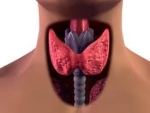
TSH Levels and HypothyroidismUnderstanding the relationship between TSH levels and hypothyroidism can be a difficult task. TSH stands for "thyroid-stimulating hormone" and hypothyroidism is a condition where a person has abnormally low thyroid hormone production. In this article we will discuss how TSH levels and hypothyroidism are related as well as other important information you should know. * Jump Start Your Thyroid With The #1 Thyroid Health Supplement... Click Here For More Info! TSH Levels and Hypothyroidism - What is the thyroid?The thyroid is a small butterfly-shaped gland at the base of the neck that produces two important hormones, thyroxine (T-4) and triiodothyronine (T-3). These hormones have a major influence on metabolism, regulation of body temperature, heart rate and other key bodily functions. When the thyroid gland does not produce adequate amounts of the mentioned hormones, a person can be considered to have hypothyroidism. This condition can lead to serious health problems if left untreated.
Hypothyroidism tends to develop gradually over many years and people who have an under active thyroid initially do not experience any signs or symptoms. For that reason the disorder often remains undetected until the patient starts developing symptoms of hypothyroidism. With that being said, blood tests that measure TSH levels can detect an under active thyroid before a person starts experiencing any hypothyroidism symptoms.
The thyroid gland and the TSH levels of T-4 and T-3 it produces are controlled by the hypothalamus. If the hypothalamus detects very low levels of thyroid hormones, it stimulates the pituitary gland to produce more TSH. If the thyroid gland fails to produce enough hormones, the pituitary gland will make even more TSH. This is why people with an under active thyroid will have low levels of thyroid hormones and high TSH levels. What are normal and abnormal TSH levels? Although normal TSH levels vary slightly from person to person, most doctors suggest that the normal range is between .5 and 5.0 μIU/ml. Using this scale, if you have TSH levels below .5 you have an overactive thyroid and could be considered to have HYPERthyroidism. If you have a TSH level above 5.0 you have an under active thyroid and could be considered to have HYPOthyroidism. This .5 to 5.0 scale has recently came under fire though and in 2002 the American Association of Clinical Endocrinologists (AACE) instituted a new TSH level reference range of .3 to 3.0 μIU/ml. The AACE believed that this new range would result in more accurate diagnosis for people with mild thyroid abnormalities that haven't been treated. * On a side note, normal TSH levels in children are higher than in adults and tend to drop gradually over the years. Diagnosing Hypothyroidism…
Blood tests that measure TSH levels are also used to diagnose what's known as subclinical hypothyroidism. Subclinical hypothyroidism is characterized by normal levels of both T-4 and T-3 hormones but abnormally high TSH levels. In closing, TSH levels and hypothyroidism have a unique relationship. High TSH levels reveal that you may have an under active thyroid (hypothyroidism) and don't have enough hormone circulating. Low TSH levels reveal that you may have an overactive thyroid (hyperthyroidism) and have too much thyroid hormone circulating.
|
Main Menu
Product Reviews
Recommended
|
Copyright © HypothyroidismExposed.com - All Rights Reserved - Subscribe To Our Feed ![]()
 How can you detect hypothyroidism?
How can you detect hypothyroidism? Depending on your measured TSH levels, a doctor will decide
whether it's necessary to take further blood tests or not. For example, if a patient has TSH levels above the
normal range the doctor typically will take a blood test that measures the levels of thyroid hormones as well.
This process helps to confirm a diagnosis of hypothyroidism.
Depending on your measured TSH levels, a doctor will decide
whether it's necessary to take further blood tests or not. For example, if a patient has TSH levels above the
normal range the doctor typically will take a blood test that measures the levels of thyroid hormones as well.
This process helps to confirm a diagnosis of hypothyroidism.

 Facebook
Facebook Digg
Digg Delicious
Delicious Reddit
Reddit Stumbleupon
Stumbleupon Twitter
Twitter Yahoo My Web
Yahoo My Web Technorati
Technorati Google Bookmarks
Google Bookmarks